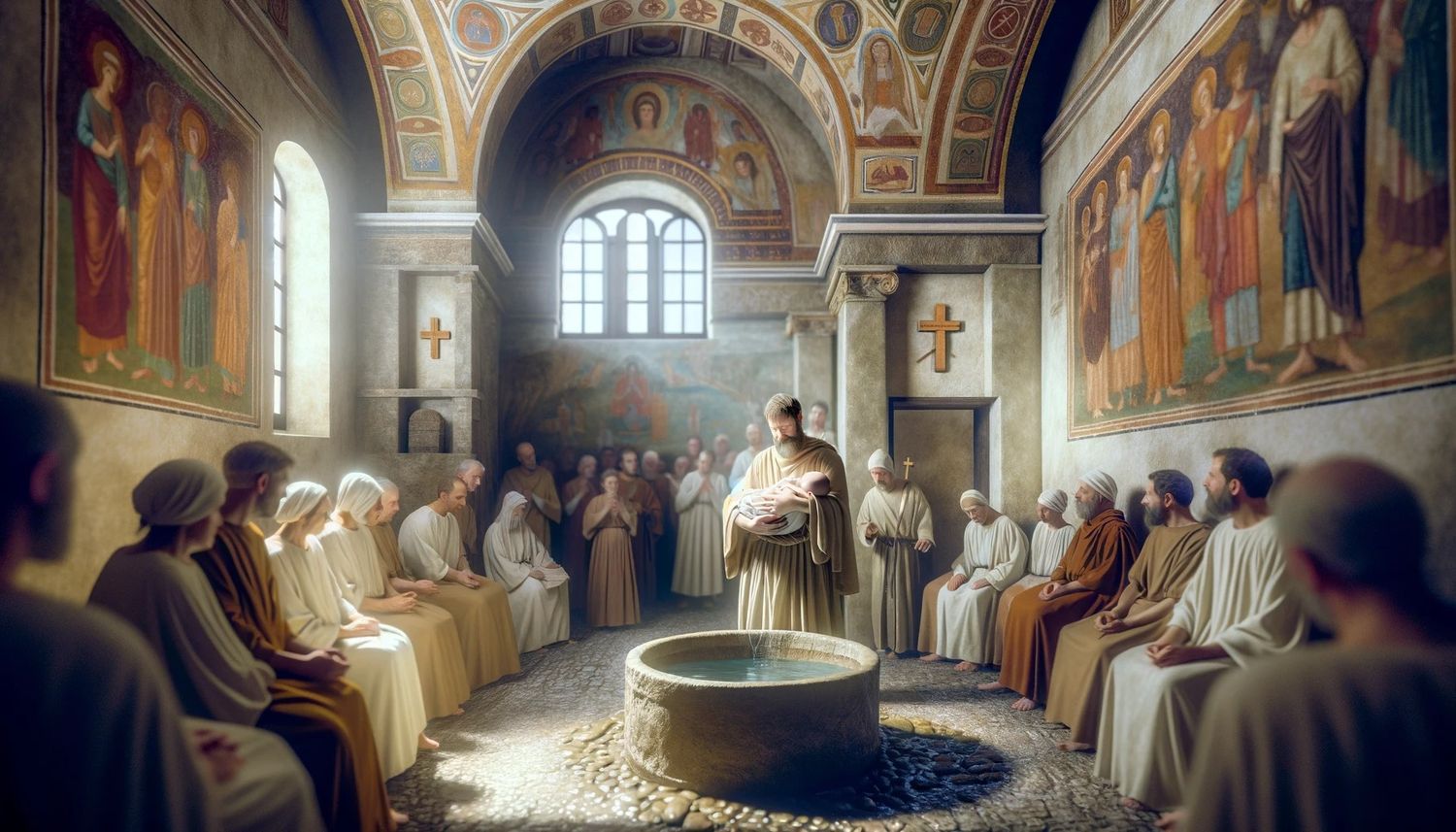Home>Theology and Spirituality>What Is Catholic Infant Baptism


Theology and Spirituality
What Is Catholic Infant Baptism
Published: March 1, 2024
Ericka Andersen, an editor at Christian.net, expertly merges digital strategy with content creation, focusing on faith and societal issues. Her communication skills enhance the platform's engaging narratives, fostering meaningful dialogue on belief's impact on society.
Learn about the theology and spirituality behind Catholic infant baptism, its significance, and the process involved. Understand the importance of this sacrament in the Catholic faith.
(Many of the links in this article redirect to a specific reviewed product. Your purchase of these products through affiliate links helps to generate commission for Christian.net, at no extra cost. Learn more)
Table of Contents
- Introduction
- The History of Catholic Infant Baptism
- The Theology Behind Catholic Infant Baptism
- The Process of Catholic Infant Baptism
- The Role of Parents and Godparents in Catholic Infant Baptism
- The Significance of Catholic Infant Baptism in the Catholic Church
- Common Questions and Misconceptions About Catholic Infant Baptism
Introduction
What is Catholic infant baptism? This is a question that many people, especially those who are not familiar with the Catholic faith, often ask. Catholic infant baptism is a significant sacrament in the Catholic Church, and it holds deep theological and spiritual significance for Catholics around the world. In this article, we will explore the history, theology, process, and significance of Catholic infant baptism, shedding light on its importance within the Catholic faith. Whether you are a curious non-Catholic seeking to understand this practice or a Catholic looking to deepen your knowledge, this article will provide valuable insights into the world of Catholic infant baptism.
The History of Catholic Infant Baptism
-
Early Christian Practices: The history of Catholic infant baptism can be traced back to the early days of Christianity. In the first few centuries after the death of Jesus Christ, the early Christian church practiced both adult and infant baptism. The belief in the necessity of baptism for salvation was a central tenet of the early Christian community.
-
Development of Infant Baptism: As the Christian community grew, the practice of infant baptism became more prevalent. By the 3rd century, there is evidence of infant baptism being widely practiced in the Christian community. This shift was influenced by the belief in the original sin and the desire to ensure the salvation of infants who were at risk of dying before they could be baptized.
-
Council of Carthage: The Council of Carthage in 418 AD played a significant role in solidifying the practice of infant baptism within the Catholic Church. The council decreed that infants should be baptized as soon as possible after birth, emphasizing the belief in the cleansing of original sin through the sacrament of baptism.
-
Medieval and Post-Reformation Period: Throughout the medieval and post-Reformation periods, infant baptism remained a central practice within the Catholic Church. The Council of Trent in the 16th century reaffirmed the importance of infant baptism, further establishing it as an integral sacrament within the Catholic faith.
-
Contemporary Practice: Today, Catholic infant baptism continues to be a widespread practice, with infants being baptized in churches around the world. The historical development of infant baptism within the Catholic Church has shaped its significance and theological understanding, making it an essential rite of passage for Catholic families.
The history of Catholic infant baptism is a testament to the enduring significance of this sacrament within the Catholic faith, reflecting the evolution of Christian beliefs and practices over the centuries.
The Theology Behind Catholic Infant Baptism
-
Original Sin: According to Catholic theology, all human beings are born with original sin, inherited from the sin of Adam and Eve. Infant baptism is seen as the means by which this original sin is cleansed, and the child is welcomed into the grace of God. The sacrament is believed to impart sanctifying grace, which is essential for salvation.
-
Incorporation into the Body of Christ: Through baptism, infants are incorporated into the mystical body of Christ, which is the Church. This incorporation signifies their initiation into the Christian community and their participation in the life of the Church. It is a foundational step in their spiritual journey as members of the Catholic faith.
-
Rebirth and Renewal: Catholic theology views baptism as a sacrament of rebirth and renewal. By being baptized, infants are symbolically cleansed of sin and are spiritually reborn as children of God. This act of renewal is a central aspect of the theological significance of infant baptism.
-
Sealing with the Holy Spirit: In Catholic theology, baptism is also seen as the sacrament through which individuals are sealed with the gift of the Holy Spirit. This sealing is believed to mark the baptized person as belonging to Christ and empowers them to live a life guided by the Holy Spirit.
-
Necessity for Salvation: The Catholic Church teaches that baptism is necessary for salvation. While the Church recognizes that God's mercy extends beyond the sacrament of baptism, the general understanding is that baptism is the ordinary means by which one is initiated into the life of grace and becomes a member of the Church.
The theology behind Catholic infant baptism is deeply rooted in the beliefs and teachings of the Catholic Church, emphasizing the spiritual significance of this sacrament for the individual, the community, and the relationship with God.
The Process of Catholic Infant Baptism
-
Preparation: The process of Catholic infant baptism typically begins with the parents or guardians of the child expressing their desire to have the child baptized. They may approach their local parish or church to initiate the process. The church may provide guidance on the requirements for baptism and the necessary preparations.
-
Selection of Godparents: The parents are usually required to select godparents for the child. Godparents play a significant role in the baptism ceremony and are expected to guide the child in their faith journey. The church may have specific requirements for godparents, such as being practicing Catholics who have received the sacraments of initiation.
-
Instruction and Formation: In some cases, the parents and godparents may be required to participate in instruction or formation sessions provided by the church. These sessions aim to deepen their understanding of the sacrament of baptism, its significance, and their responsibilities in nurturing the child's faith.
-
Baptismal Ceremony: The actual baptismal ceremony typically takes place during a Mass or a separate liturgical celebration. The child is presented to the priest or deacon, and the sacrament of baptism is administered. The priest or deacon may perform the baptism by pouring water over the child's head or by immersion, while invoking the Trinitarian formula ("In the name of the Father, and of the Son, and of the Holy Spirit").
-
Anointing and Clothing: Following the baptism, the child may be anointed with chrism, a consecrated oil, symbolizing the gift of the Holy Spirit. The child is then clothed in a white garment, symbolizing their new life in Christ and their purity as a baptized member of the Church.
-
Lighting of the Baptismal Candle: The baptismal candle, lit from the Easter candle, is presented to the child's parents and godparents as a symbol of the light of Christ. It represents the child's call to live as a child of the light and to bear witness to the faith.
-
Welcome into the Community: The entire community present at the baptismal ceremony plays a role in welcoming the newly baptized child into the Church. The congregation may offer prayers for the child and their family, affirming their commitment to support and nurture the child in their faith journey.
The process of Catholic infant baptism is a sacred and joyous occasion, marking the beginning of the child's life as a member of the Christian community and their journey of faith within the Catholic Church.
The Role of Parents and Godparents in Catholic Infant Baptism
The role of parents and godparents in Catholic infant baptism is integral to the sacramental journey of the child. Both parents and godparents play significant roles in nurturing the child's faith and guiding them in their spiritual development within the Catholic Church.
Read more: Why Infant Baptism Is Wrong
Parents
-
Desire for Baptism: The parents are the initiators of the baptismal process for their child. It is their desire for the child to be baptized into the Catholic faith that sets the sacramental journey in motion.
-
Promise of Faith: During the baptismal ceremony, the parents are called upon to renew their own baptismal promises and profess their faith in God. This act signifies their commitment to raising the child in the Catholic faith and providing a nurturing environment for the child's spiritual growth.
-
Primary Educators of the Faith: The Catholic Church recognizes parents as the primary educators of their children in matters of faith. It is the responsibility of the parents to instill Catholic values, teachings, and traditions in the child's upbringing, fostering a strong foundation of faith within the family.
-
Lifelong Support: Beyond the baptismal ceremony, the parents are expected to continue supporting the child in their faith journey, providing opportunities for religious education, participation in the sacraments, and engagement with the Catholic community.
Godparents
-
Spiritual Guardians: Godparents, also known as sponsors, are chosen by the parents to serve as spiritual guides and mentors to the child. They are entrusted with the responsibility of supporting the child in their Catholic faith and serving as role models in the practice of the faith.
-
Witnesses to Baptism: During the baptismal ceremony, godparents stand alongside the parents as witnesses to the child's baptism. They affirm their commitment to supporting the child in their faith journey and upholding the teachings of the Catholic Church.
-
Prayerful Intercession: Godparents are encouraged to pray for the spiritual well-being of the child and to actively participate in their religious upbringing. Their prayers and guidance are meant to provide additional spiritual support to the child as they grow in their faith.
-
Active Participation: Godparents are expected to actively participate in the child's religious education and formation, offering guidance, encouragement, and support as the child progresses in their understanding of the Catholic faith.
The roles of parents and godparents in Catholic infant baptism extend beyond the ceremony itself, encompassing a lifelong commitment to nurturing the child's spiritual growth and fostering a deep connection to the Catholic faith.
The Significance of Catholic Infant Baptism in the Catholic Church
-
Initiation into the Faith: Catholic infant baptism holds immense significance as it marks the initiation of the child into the Catholic faith. Through the sacrament of baptism, the child becomes a member of the Church, embracing the beliefs, traditions, and spiritual heritage of Catholicism from the earliest stages of life.
-
Cleansing of Original Sin: One of the central aspects of the significance of infant baptism is the cleansing of original sin. According to Catholic theology, all human beings are born with original sin, and baptism is the means by which this sin is washed away, allowing the child to enter into a state of grace and communion with God.
-
Reception of Sanctifying Grace: Catholic infant baptism is a conduit for the reception of sanctifying grace, which is essential for salvation. The sacrament bestows upon the child the grace necessary for a life of faith, virtue, and participation in the divine life of God.
-
Incorporation into the Body of Christ: Through baptism, the child is incorporated into the mystical body of Christ, which is the Church. This incorporation signifies the child's belonging to the community of believers and their participation in the life and mission of the Church.
-
Sealing with the Holy Spirit: Baptism in the Catholic Church is also significant as it marks the child's sealing with the gift of the Holy Spirit. This sealing is believed to impart spiritual strength and guidance, empowering the child to live a life guided by the Holy Spirit and to bear witness to the Christian faith.
-
Entrance into the Sacramental Life: Infant baptism opens the door for the child to receive the other sacraments of the Catholic Church as they grow, including the Eucharist, Confirmation, and Reconciliation. It lays the foundation for the child's ongoing participation in the sacramental life of the Church.
-
Family and Community Celebration: The significance of Catholic infant baptism is also evident in the communal celebration it entails. The baptismal ceremony brings together the family, godparents, and the wider Catholic community to welcome the child into the faith, offering prayers, support, and blessings for the child's spiritual journey.
-
Promise of Faith and Responsibility: Through infant baptism, the parents and godparents make a solemn promise to nurture the child's faith and provide a supportive environment for their spiritual growth. This promise reflects the shared responsibility of the entire Catholic community in fostering the child's relationship with God and the Church.
-
Eternal Implications: From a theological perspective, the significance of infant baptism extends to its eternal implications. The sacrament is seen as the gateway to eternal life, ensuring that the child is united with Christ and has the hope of salvation in the life to come.
-
Continuity of Tradition: Catholic infant baptism also holds significance in its role in preserving and passing on the rich traditions and beliefs of the Catholic Church from one generation to the next. It reflects the continuity of the faith and the enduring presence of Catholicism in the lives of families and communities.
The significance of Catholic infant baptism in the Catholic Church encompasses a profound spiritual, communal, and theological dimension, shaping the identity and journey of the baptized child within the Catholic faith.
Common Questions and Misconceptions About Catholic Infant Baptism
Read more: What Is A Proxy In A Catholic Baptism
1. Is Infant Baptism Necessary for Salvation?
One common question surrounding Catholic infant baptism is whether it is necessary for the salvation of the child. While the Catholic Church teaches that baptism is necessary for salvation, it also acknowledges the concept of "baptism of desire" and "baptism of blood." These concepts extend God's mercy and grace to those who, through no fault of their own, do not receive the sacrament of baptism. However, infant baptism remains the ordinary means by which a child is initiated into the life of grace and becomes a member of the Church.
2. Can Non-Catholic Parents Have Their Child Baptized in the Catholic Church?
It is not uncommon for non-Catholic parents to seek baptism for their child in the Catholic Church. In such cases, the Catholic Church welcomes the opportunity to baptize the child, provided that there is a well-founded hope that the child will be raised in the Catholic faith. The parents may be asked to express their intention to raise the child as a Catholic and to provide assurance that the child will be given the opportunity to learn about and practice the Catholic faith.
3. What Happens if the Parents or Godparents Are Not Practicing Catholics?
The active practice of the Catholic faith by parents and godparents is an important aspect of the baptismal preparation. However, if the parents or godparents are not currently practicing Catholics, the Church may offer guidance and support to help them re-engage with their faith. The focus is on fostering a genuine commitment to the child's Catholic upbringing and providing the necessary resources for the parents and godparents to grow in their faith.
4. Can a Child Be Baptized Without Godparents?
In the Catholic Church, the presence of godparents is customary and holds significant spiritual and communal importance. However, in exceptional circumstances where suitable godparents cannot be present, the Church may make allowances for the baptism to proceed with the understanding that the child will still receive the necessary support and guidance in their faith journey.
Read more: What Is Needed For A Catholic Baptism
5. Are There Any Age Restrictions for Infant Baptism?
The term "infant baptism" may lead to the misconception that there is a specific age limit for the sacrament. In the Catholic Church, there is no strict age restriction for infant baptism. The emphasis is on the spiritual well-being of the child, and the sacrament may be administered to infants and young children who have not reached the age of reason, which is typically around seven years old.
6. Does Infant Baptism Guarantee a Child's Faith in the Future?
While infant baptism is a significant step in the child's initiation into the Catholic faith, it does not guarantee the child's faith in the future. The role of parents, godparents, and the broader Catholic community is to provide ongoing support, guidance, and religious education to nurture the child's faith as they grow. The sacrament of baptism lays the foundation for the child's spiritual journey, but the development of faith is a lifelong process that requires continuous nurturing and formation.
7. Is Infant Baptism Just a Tradition or a Meaningful Sacrament?
Some individuals may view infant baptism as a mere tradition without recognizing its profound significance as a sacrament within the Catholic Church. The Church's teachings emphasize the theological, spiritual, and communal importance of infant baptism, highlighting its role in the child's incorporation into the body of Christ, the cleansing of original sin, and the reception of sanctifying grace. It is not merely a ritual but a deeply meaningful sacramental initiation into the Catholic faith.
8. Can a Child Be Baptized Twice if the First Baptism Was Not in the Catholic Church?
The Catholic Church recognizes the validity of baptism in other Christian traditions if it is performed with water and the Trinitarian formula ("In the name of the Father, and of the Son, and of the Holy Spirit"). As such, a child who has already been baptized in another Christian denomination would not be baptized again in the Catholic Church. Instead, the Church would recognize the prior baptism and welcome the child into the Catholic faith through a rite called "reception into full communion."
Addressing common questions and misconceptions about Catholic infant baptism is essential in fostering a deeper understanding of the sacrament and its significance within the Catholic faith. Clarifying these aspects can provide clarity and insight for individuals seeking to engage with the practice of infant baptism within the Catholic Church.












